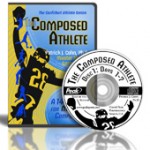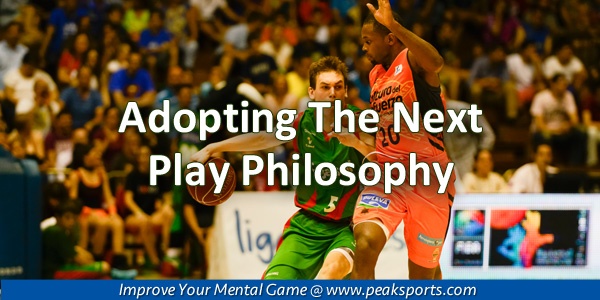How Athletes Can Overcome Mistakes
One of the hardest things for any athlete is to move forward after a mistake and focus “in the moment.”
Yet athletes are constantly told by coaches to forget about the last play, the previous point or the mistake that happened.
Think about a time when, in the heat of battle, you made a critical mistake…
For example, the gymnast that falls off the balance beam, the goal keeper that froze and let in a cheap goal, the tennis player that slammed the ball long when he had his opponent leaning the opposite way…
You probably felt a rush of negative emotions (frustration, anger, embarrassment) flow through your body and mind.
You look at your coach and your coach says,
“Forget about that mistake.”
It is not like you think,
“Hey that’s great advice, I feel better now.”
In fact, you probably grab onto the most profound word in that sentence, MISTAKE, and replay it in your mind until you are totally taken out of your game…
You know performing in the moment is necessary, but it seems impossible to focus to do after you make a stupid mistake or error on a routine play.
Why is it so difficult to let go of that stupid mistake?
One explanation is that you are human.
When you make a mistake, it’s normal to be upset. If you’re never upset after a mistake, either you don’t care or you expect to always under-perform.
The second explanation is that you were not taught how to let go of mistakes, have not practiced the skill of focusing in the moment, or have not learned how to refocus after a mistake.
Mike Krzyzewski, head basketball coach for the Duke Blue Devils understands the value of teaching the ability to focus, in addition to learning the “X’s” and “O’s” of the game.
KRZYZEWSKI: “To waste time lamenting a mistake or celebrating success is distracting and can leave you and your team unprepared for what you are about to face. It robs you of the ability to do your best at that moment and to give your full concentration.”
Krzyzewski teaches something he calls the “next play” philosophy and there is no denying that this philosophy has helped his teams win five national championships, appear in 12 Final Four games and take home 26 ACC regular-season and tournament titles.
This “next play” philosophy or mindset was ingrained in him when he was an undergraduate at the U.S. Military Academy.
KRZYZEWSKI: “It’s more like a West Point thing, like what’s your next mission? So, whenever you got knocked back individually and collectively [as a team], they taught you, ‘OK, next play. What am I going to do next?'”
No matter what your sport, you can adopt Krzyzewski’s successful philosophy and, with some practice, you can learn to quickly re-focus after a mistake.
A Tip For Adopting The ‘Next Play’ Philosophy:
Process the mistakes and start asking yourself, “What’s next?”
This prompt helps you focus on what you have to do next. This gets your head out of the last play and puts your focus in the present moment.
If you consistently ask yourself this question, you will develop the habit of focusing on the present moment.
Athletes that judge themselves during their performance can apply the same strategy. Instead of thinking about how well you performed the last play or skill, tell yourself “NEXT.”
Related Sports Psychology Articles
- Golf Psychology Video: Letting Go of Mistakes
- Sports Psychology: Letting Go of Errors
- Control Your Focus to Let Go of Mistakes
*Subscribe to The Sports Psychology Podcast on iTunes
*Subscribe to The Sports Psychology Podcast on Spotify
Download a free sports psychology report to improve your mental game!
Learn more about our one-on-one mental game coaching.
The Composed Athlete

“The Composed Athlete” is presented on 80-minute Audio Programs with a 70-page step-by-step workbook that guides you through the program each day. It’s a complete system for conditioning your mind to have maximum composure in competition.
“The Composed Athlete” was developed for any level coach, parent, or junior to professional athlete who wants to improve performance and gain a competitive edge. It does not matter if you are a fledgling junior athlete; or a seasoned professional, plagued with distractions; or you just wanting to learn how to improve your composure…

